When deciding between Airbnb and traditional rentals, you'll need to weigh several key factors. Airbnb can offer 20-40% higher returns in tourist areas but demands more hands-on management and higher operational costs. You'll face daily tasks like check-ins, cleanings, and maintenance issues, while traditional leasing provides steady income with minimal involvement. Local laws may require permits or restrict short-term rentals entirely, and you'll need proper insurance coverage. Consider your time commitment, market competition, and willingness to handle guest relations. The right choice depends on your property's location, local regulations, and personal bandwidth for management responsibilities.
Key Takeaways
- Airbnb typically generates 20-40% higher returns in tourist areas but requires significantly more time and effort for daily management.
- Traditional leasing offers steady income with minimal involvement, while Airbnb demands constant attention to guest needs and property maintenance.
- Local regulations, permits, and zoning laws can restrict or prohibit short-term rentals, making traditional leasing the only viable option.
- Operational costs are higher for Airbnb due to frequent cleaning, utilities, and amenity replacement compared to traditional long-term rentals.
- Market saturation and seasonal fluctuations can impact Airbnb profitability, while traditional leasing provides more predictable year-round income.
Local Laws and Rental Regulations
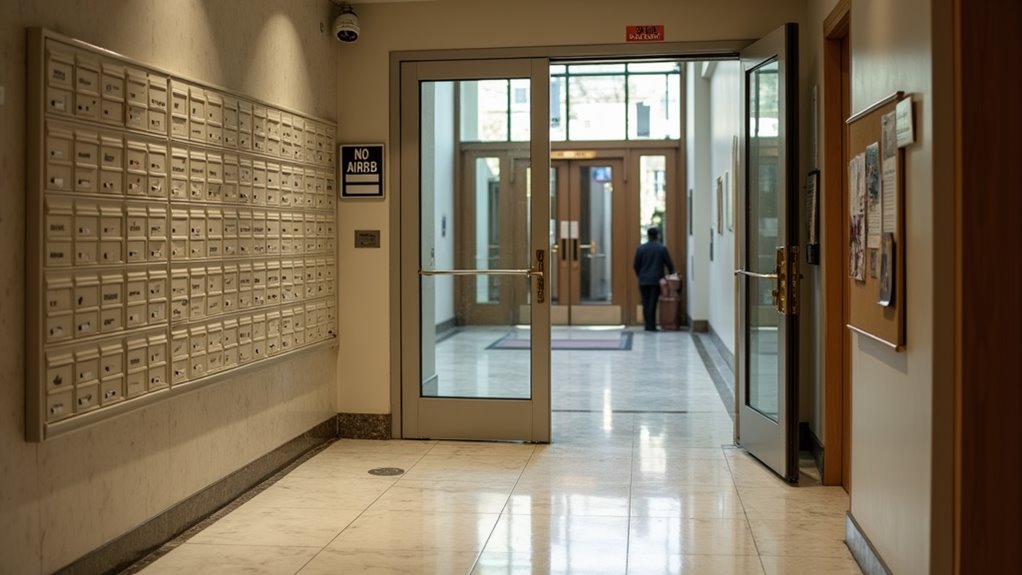
Before listing your property on Airbnb, you'll need to understand your local rental regulations, as cities worldwide have different rules for short-term rentals.
Some municipalities require specific permits, licenses, or registrations, while others restrict the number of days you can rent annually.
You'll want to check your city's zoning laws, which may prohibit short-term rentals in certain residential areas.
Many regions also enforce occupancy limits, parking restrictions, and safety requirements like smoke detectors and fire extinguishers.
If you're a renter, you'll need your landlord's permission, and if you live in a condo or HOA community, review their policies on short-term rentals.
Tax obligations vary by location too. You might need to collect and remit hotel taxes, tourist fees, or other local levies.
Financial Returns Vs Traditional Leasing
Weighing the financial returns between Airbnb and traditional leasing requires careful consideration of multiple factors. You'll typically earn more per night with Airbnb, but you'll also face higher operational costs and more intensive management responsibilities.
With traditional leasing, you'll secure steady, predictable income and lower maintenance demands. Your tenants handle utilities, and you won't need to frequently clean, restock supplies, or manage daily guest communications.
However, you might miss out on peak-season profits and the flexibility to use the property yourself. Your property's location, market demand, and personal time investment will impact your bottom line.
While Airbnb can yield 20-40% higher returns in tourist hotspots, traditional leasing often proves more profitable in residential areas with stable, long-term rental demand.
Property Management Time Commitments
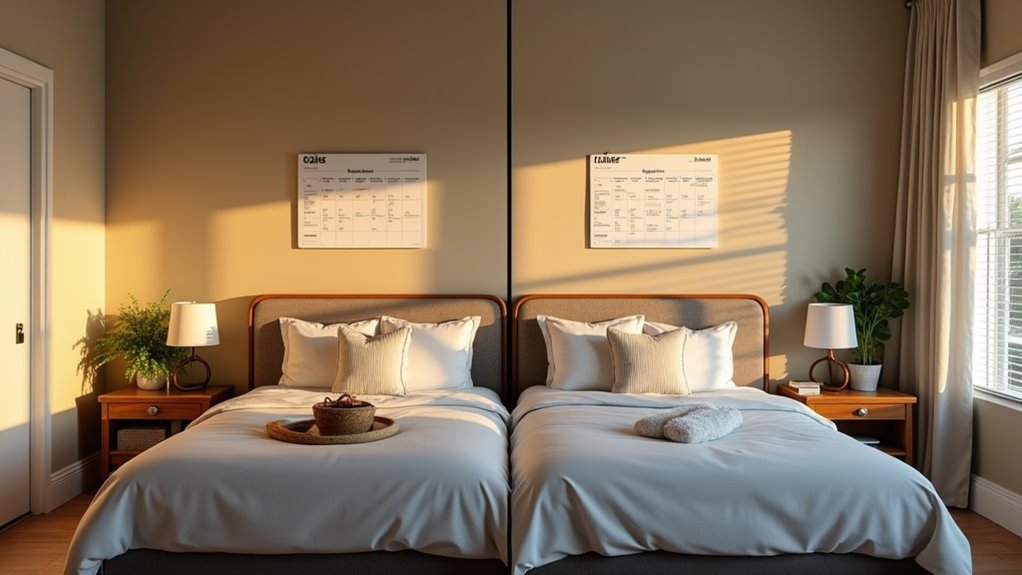
Beyond the financial calculations, your available time might be the deciding factor between Airbnb and traditional leasing.
Airbnb hosting demands significantly more hands-on management than traditional rentals. You'll need to handle guest communications, check-ins, cleanings, restocking supplies, and maintenance issues on a frequent basis.
Traditional leasing requires less day-to-day involvement. Once you've found reliable tenants, your main tasks include collecting monthly rent, addressing occasional maintenance issues, and conducting annual property inspections.
With Airbnb, you're essentially running a hospitality business that requires constant attention to detail and guest satisfaction.
If you can't commit several hours weekly to property management, consider hiring a professional service to handle these tasks – though this will cut into your profits significantly.
Market Competition and Demand
As you evaluate an Airbnb investment, understanding your local market's supply and demand dynamics is crucial. Research the number of existing short-term rentals in your area and analyze their occupancy rates throughout different seasons.
You'll need to assess tourist attractions, business centers, and local events that drive visitor traffic. Consider checking your competition's pricing strategies and reviews to identify potential market gaps.
Keep in mind that oversaturated markets can lead to lower occupancy rates and reduced profitability. Major cities often face stricter regulations and intense competition, while emerging destinations might offer better opportunities.
You'll also want to track seasonal fluctuations – some locations thrive during summer months but struggle in winter. Understanding these patterns will help you forecast revenue and make informed decisions about your investment.
Guest Safety and Insurance
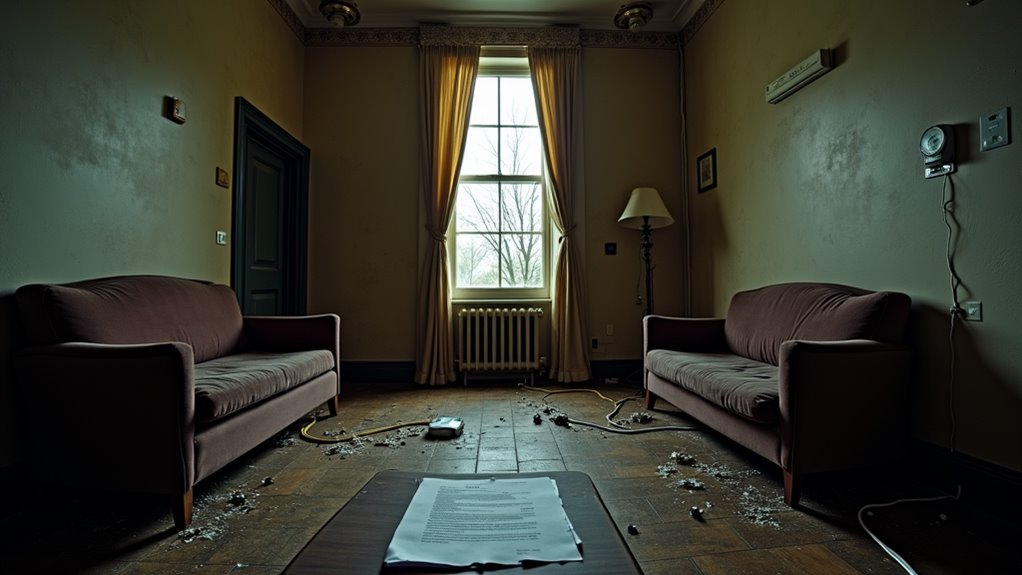
While operating a successful Airbnb requires attention to many details, guest safety and proper insurance coverage should be your top priorities.
You'll need both homeowner's insurance and specialized short-term rental coverage to protect yourself from liability and property damage. Install safety equipment like smoke detectors, carbon monoxide alarms, fire extinguishers, and security cameras in common areas.
Create an emergency manual with local contacts, evacuation routes, and medical facilities. Keep a first aid kit accessible and ensure all locks, lighting, and walkways are well-maintained.
Remember to regularly inspect appliances and schedule professional maintenance. You're also responsible for following local safety codes and regulations.
Don't skimp on these measures – one incident without proper coverage or safety protocols could end your hosting business.
Neighborhood Impact and Relations
When you rent your property on Airbnb, you'll need to consider how rotating short-term guests affect your neighbors' peace and privacy.
Your guests mightn't understand local noise ordinances or community norms, leading to complaints about late-night activities and increased traffic.
The steady stream of unfamiliar faces in residential areas can also alter the neighborhood's character, turning what was once a close-knit community into something closer to a hotel zone.
Noise and Privacy Issues
Despite Airbnb's popularity among travelers, the platform's impact on neighborhood dynamics has sparked ongoing concerns about noise and privacy. You'll find that rotating short-term guests can disrupt the quiet environment long-term residents expect, especially when visitors treat properties like party venues.
Privacy becomes a significant issue when you're living next to an Airbnb. You might notice strangers coming and going at all hours, unfamiliar cars parked in shared spaces, and security concerns as guest access codes circulate.
While some hosts implement strict noise policies and security measures, you can't guarantee every guest will respect these guidelines. If you're considering hosting or living near an Airbnb, it's crucial to understand how these disruptions might affect your daily life and property value.
Community Character Changes
As neighborhoods witness a surge in short-term rentals, the traditional fabric of communities begins to unravel.
You'll notice fewer familiar faces as long-term residents move out, replaced by a rotating cast of temporary visitors who don't share the same investment in community well-being.
These changes can affect your daily life in subtle but significant ways.
The corner store might shift its inventory to cater to tourists rather than residents' needs. Your children's playmates may disappear as families sell their homes to short-term rental investors.
Community events and local organizations often suffer from decreased participation, while the sense of mutual support among neighbors diminishes.
You'll find that the distinctive character that once made your neighborhood special slowly fades as homes transform into quasi-hotels.
Maintenance and Operational Costs
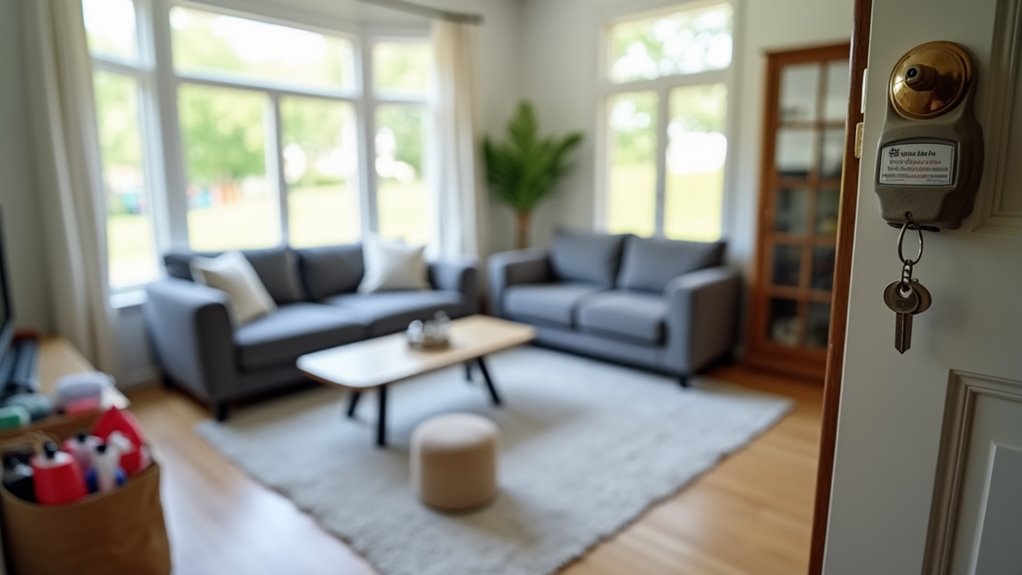
When you're operating an Airbnb rental, you'll need to budget for accelerated property wear and tear from frequent guest turnover.
You must factor in regular cleaning services between stays, which can cost significantly more than traditional long-term rental maintenance.
Managing utility bills becomes more complex as guest usage varies dramatically, often requiring you to adjust your pricing strategy to cover these fluctuating expenses.
Property Wear and Tear
Operating an Airbnb property comes with significant maintenance demands that many hosts initially underestimate.
You'll find that frequent guest turnover leads to accelerated wear on furniture, appliances, and fixtures. High-traffic areas like kitchens and bathrooms often need more frequent repairs and replacements than traditional long-term rentals.
You'll need to budget for replacing bedding, towels, and kitchenware more often, as these items face daily use from different guests.
Walls will require more frequent painting due to luggage scuffs and general wear, while flooring might need replacement sooner than expected.
Even small items like door handles, light switches, and remote controls experience increased usage.
Smart hosts plan for this heightened wear by selecting durable materials and maintaining a replacement fund for inevitable repairs.
Regular Cleaning Expenses
Regular cleaning expenses represent one of the largest ongoing operational costs you'll face as an Airbnb host. You'll need to budget for professional cleaning services between each guest stay, which typically costs $50-150 per turnover, depending on your property's size and location.
These fees include changing linens, sanitizing bathrooms, dusting surfaces, and deep cleaning floors.
Beyond standard turnovers, you'll also need quarterly deep cleaning services for carpets, upholstery, and windows.
Don't forget about restocking essential supplies like toilet paper, soap, and cleaning products.
Many successful hosts build these expenses into their nightly rates, charging guests a separate cleaning fee to offset costs.
Consider establishing relationships with reliable cleaning services that offer discounted rates for regular bookings to help manage these recurring expenses effectively.
Utility Bill Management
Managing utility bills for your Airbnb property requires careful planning and monitoring to maintain profitability.
You'll need to factor in electricity, water, gas, internet, and potentially cable TV costs into your rental pricing strategy. These expenses can fluctuate significantly based on guest usage and seasonal changes.
To keep utility costs under control, you should install energy-efficient appliances, smart thermostats, and low-flow water fixtures.
It's wise to include utility costs in your nightly rate rather than charging separately, as this simplifies the booking process for guests.
You'll also want to track monthly usage patterns to identify potential issues, like water leaks or excessive energy consumption.
Consider setting reasonable usage limits in your house rules and providing clear instructions for operating thermostats and appliances efficiently.
Frequently Asked Questions
How Do I Handle Guest Complaints During Their Stay?
Address guest complaints promptly and professionally.
Listen carefully to their concerns, acknowledge their frustration, and take immediate action to resolve the issue.
Document all communication and keep a record of steps taken.
If you can't fix the problem right away, offer alternatives or compensation.
Stay calm and maintain open communication throughout their stay to prevent small issues from escalating into major problems.
Can I Restrict Certain Age Groups or Party Sizes?
You can restrict party sizes by clearly stating maximum occupancy limits in your listing rules, but you can't discriminate based on age due to fair housing laws.
You're allowed to set a minimum age requirement (typically 18 or 25) for the primary renter who signs the rental agreement.
Be sure to specify your party size limits and age requirements in your house rules and booking policies.
What Amenities Do Successful Airbnb Hosts Typically Provide?
You'll want to provide essential amenities that make guests feel at home.
Start with high-speed WiFi, smart TV access, and a well-equipped kitchen including coffee maker, microwave, and basic cooking supplies.
Don't forget quality linens, towels, and toiletries.
A washer/dryer, air conditioning, and comfortable furniture are must-haves.
Extra touches like USB charging stations, hair dryers, and basic pantry items can boost your ratings significantly.
Should I Hire a Professional Photographer for My Property Listing?
Yes, you should hire a professional photographer for your property listing.
Professional photos can increase bookings by up to 40% and allow you to charge higher rates.
They'll capture your space's best angles, lighting, and features in a way that smartphone photos rarely can.
While it's an upfront investment of $200-500, you'll likely recover the cost quickly through increased bookings and better reviews from guests who arrive with accurate expectations.
How Do I Set Different Seasonal Pricing for My Rental?
Setting seasonal rates could make the difference between a ghost town and a gold mine for your rental.
You'll want to research local events, peak tourist seasons, and weather patterns in your area.
Create different pricing tiers using your platform's calendar tools, adjusting rates for high season (summer/holidays), shoulder season (spring/fall), and low season (winter).
Don't forget to factor in local competition and special events.
Conclusion
You'll find that succeeding in the Airbnb market isn't as easy as playing Pac-Man. Before diving in, weigh your local regulations, financial projections, and time availability against traditional renting. Don't forget to consider your neighbors' concerns and ongoing maintenance costs. Whether you choose short-term or long-term rentals, your success depends on thorough research and realistic expectations of the commitment involved.
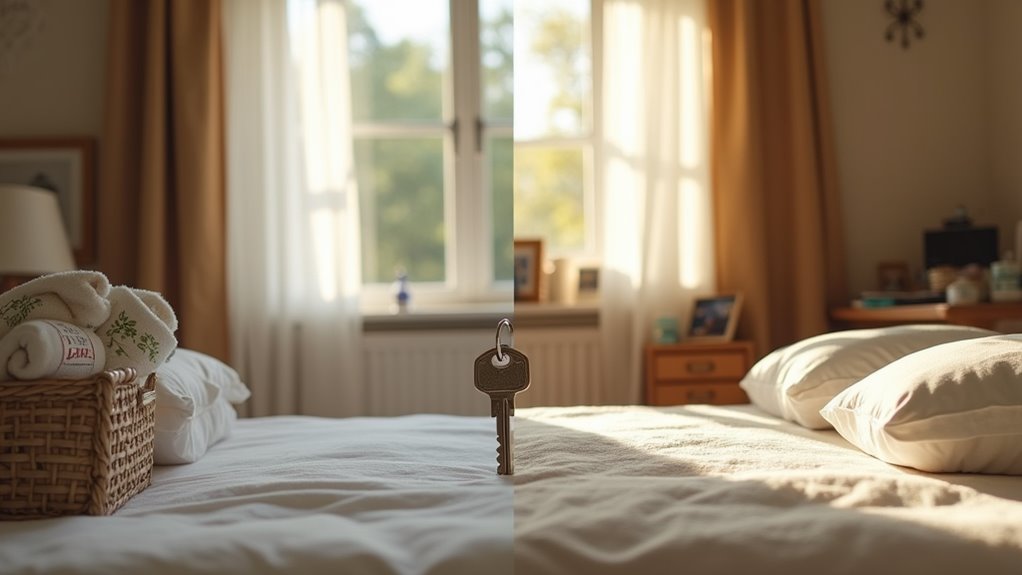
Leave a Reply